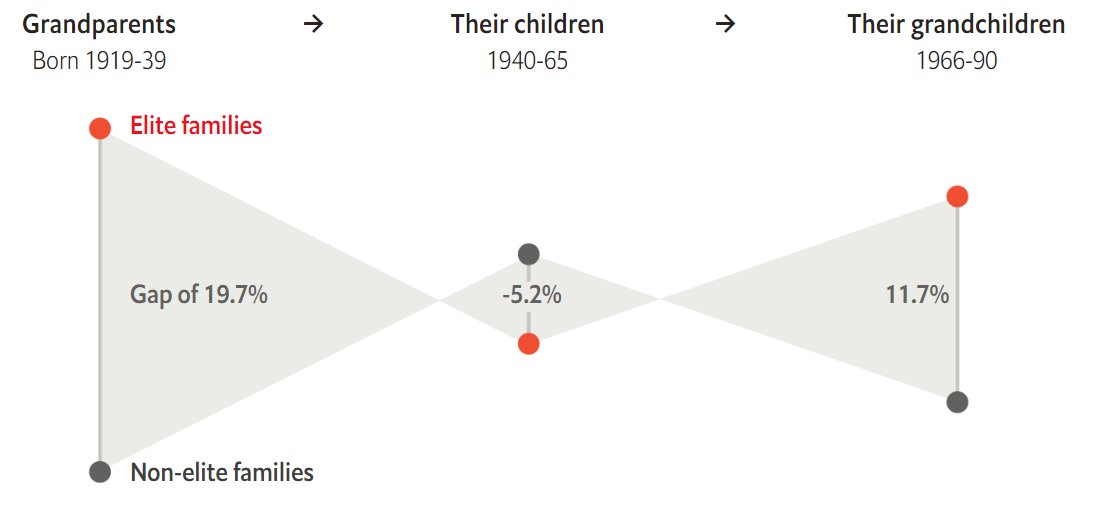Above is the average genetic score of high school students, but I'll get to that later.
Below are the results of a meta-analysis on education. Here, education, using different methods, points to a 1-3 IQ point increase per additional year!
Below are the results of a meta-analysis on education. Here, education, using different methods, points to a 1-3 IQ point increase per additional year!

So there is certainly an effect! But let's put that into context: a 3 IQ point increase equals a Cohen's d of 0.2, or 1% of the variance.
1% isn't nothing, but look at what the rest shows us: the smartest students are considerably better, 3 IQ points is small in comparison.
1% isn't nothing, but look at what the rest shows us: the smartest students are considerably better, 3 IQ points is small in comparison.

And here are scores in terms of distributions, shifting a distribution by 0.2 SD (or a few points here) is about the difference between a 7th and an 8th grader. 

Moreover, the improvement from (in this case, higher) education is short-lived. This improvement to IQ only seems apparent for the first two years; education thereafter has no effect. 

Ok, so we get a few IQ points from education, what are we to make of this?
Well, we can track the results of other studies where people get more education: What else happens?
Here's a study of education reform in Britain. In 1947, 80% of pupils received more education.
Well, we can track the results of other studies where people get more education: What else happens?
Here's a study of education reform in Britain. In 1947, 80% of pupils received more education.

The study tracked labor market outcomes, i.e., was this cohort more employed after the change, even a little bit?
Sadly, this intervention had no effect on existing employment trends.
Sadly, this intervention had no effect on existing employment trends.

There's more! Using another education initiative in Britain, a study measured features of the students' brains who received this extra education and those who didn't.
Again, no difference.
Again, no difference.

We can go global, many countries in the last few decades have dramatically increased education, especially those in Africa.
But there are no noticeable effects on test scores here; these regional differences remain resolute.
But there are no noticeable effects on test scores here; these regional differences remain resolute.

So what's going on? The key is that education increases IQ but not necessarily intelligence itself.
Consider that an IQ test has different parts, and some will be more related to intelligence than others. The less related ones can be easier to learn.
Consider that an IQ test has different parts, and some will be more related to intelligence than others. The less related ones can be easier to learn.
Here's the evidence: If we take measures of IQ at age 11 and later in life, we can use structural modeling to fit the data.
Below are three models, two where education affects intelligence (g, the general factor) and one that doesn't. Can you guess which one fits best?
Below are three models, two where education affects intelligence (g, the general factor) and one that doesn't. Can you guess which one fits best?

Of course, it was the latter. Education is only related to some specific abilities.
See here: Schooling was related to better performance on some tasks, but not all. For example, Backward Digit Span performance was only influenced by intelligence.
See here: Schooling was related to better performance on some tasks, but not all. For example, Backward Digit Span performance was only influenced by intelligence.

So if it's not education and other studies find few other environmental effects, this leads to the main cause of intelligence differences: genetics.
Here is from above: throughout high school, people become more and more differentiated genetically in the classes they take.

Here is from above: throughout high school, people become more and more differentiated genetically in the classes they take.


In the same way, your parents can have a large effect on whether you go to college, but can't affect your college grades; the fact that your teacher can nudge your abilities on some tasks doesn't mean that you are more generally intelligent. 

Sources:
nature.com/articles/s4153…
doi.org/10.1177/095679…
sciencedirect.com/science/articl…
nature.com/articles/s4158…
gwern.net/doc/dual-n-bac…
osf.io/preprints/psya……
biorxiv.org/content/10.110…
pmc.ncbi.nlm.nih.gov/articles/PMC44…
cremieux.xyz/p/adjust-your-…
nature.com/articles/s4153…
doi.org/10.1177/095679…
sciencedirect.com/science/articl…
nature.com/articles/s4158…
gwern.net/doc/dual-n-bac…
osf.io/preprints/psya……
biorxiv.org/content/10.110…
pmc.ncbi.nlm.nih.gov/articles/PMC44…
cremieux.xyz/p/adjust-your-…
• • •
Missing some Tweet in this thread? You can try to
force a refresh

















